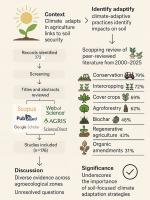PRISMA-ScR: A scoping review of rooted resilience in advancing climate-adaptive agriculture for soil health and security
引用次数: 0
Abstract
Climate change threatens agricultural productivity and soil health through rising temperatures, unpredictable rainfall, and land degradation. This scoping review aimed to map and synthesize evidence on adaptive agricultural practices that support soil functionality, resilience, and productivity, particularly in climate-vulnerable regions. Using the PRISMA-ScR framework, 1587 sources were screened, and 178 peer-reviewed articles were included for detailed analysis. The review identified key strategies such as cover cropping, organic amendments, reduced tillage, diversified cropping systems, agroforestry, and targeted nutrient management. Across diverse agroecological settings, these practices increased soil organic carbon by 8–25 %, improved water retention and microbial activity, and supported yield gains of 10–40 % under climate stress. Despite documented benefits, adoption remains limited due to economic constraints, knowledge gaps, and lack of enabling policies. Integrated approaches that blend scientific research with local knowledge and context-specific management have shown potential to strengthen soil resilience. Findings highlight the importance of healthy soils for climate-adaptive agriculture, food security, and ecosystem services. Enhancing adaptive soil management offers a pathway toward more resilient and sustainable farming systems in the face of ongoing climate change.

PRISMA-ScR:对推进气候适应性农业促进土壤健康和安全的根本性复原力进行范围审查
气候变化通过气温上升、不可预测的降雨和土地退化威胁着农业生产力和土壤健康。本综述旨在绘制和综合适应性农业实践的证据,以支持土壤功能、恢复力和生产力,特别是在气候脆弱地区。使用PRISMA-ScR框架,筛选了1587个来源,并纳入178篇同行评议文章进行详细分析。该综述确定了覆盖种植、有机改良、减少耕作、多样化种植制度、农林业和有针对性的养分管理等关键战略。在不同的农业生态环境中,这些做法使土壤有机碳增加了8 - 25%,改善了保水能力和微生物活性,并在气候胁迫下支持了10 - 40%的产量增长。尽管有记录的好处,但由于经济限制、知识差距和缺乏扶持政策,采用仍然有限。将科学研究与当地知识和因地制宜的管理相结合的综合方法已显示出加强土壤恢复力的潜力。研究结果强调了健康土壤对气候适应性农业、粮食安全和生态系统服务的重要性。面对持续的气候变化,加强适应性土壤管理为建立更具抵御力和可持续性的农业系统提供了一条途径。
本文章由计算机程序翻译,如有差异,请以英文原文为准。
求助全文
约1分钟内获得全文
求助全文

 求助内容:
求助内容: 应助结果提醒方式:
应助结果提醒方式:


